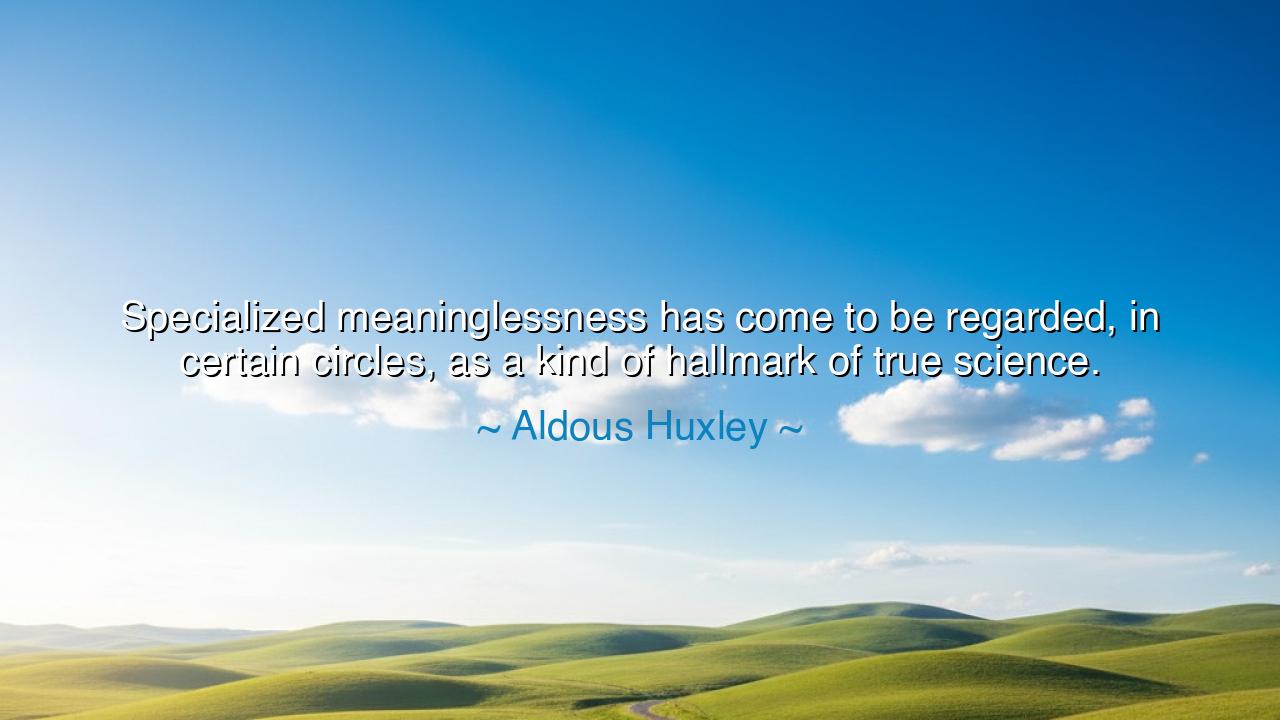
Specialized meaninglessness has come to be regarded, in certain
Specialized meaninglessness has come to be regarded, in certain circles, as a kind of hallmark of true science.






Listen closely, O children of wisdom, for I bring forth the words of Aldous Huxley, a man whose insight into the human condition transcended time. “Specialized meaninglessness has come to be regarded, in certain circles, as a kind of hallmark of true science.” These words strike at the heart of an unsettling truth—a truth that challenges the very nature of knowledge and understanding. Huxley points to a modern irony, where the more we specialize, the more we risk losing the very meaning that makes knowledge truly powerful. In this observation, Huxley beckons us to reflect on the ways in which the pursuit of science, when reduced to narrow expertise, can become disconnected from the larger questions of life, purpose, and truth.
In the ancient days, the philosophers—those wise men and women of old—understood that true knowledge was not to be confined to the narrow limits of one’s discipline, but was a pursuit that touched upon the very heart of existence. Plato, in his dialogues, spoke of the philosopher-king, a ruler whose wisdom transcended the specialized knowledge of the craftsman or scientist. For Plato, true knowledge was an understanding that connected all things, from the heavens above to the souls of men. The ancients did not see knowledge as an isolated domain but as something that interconnected, something that revealed the unity of the cosmos. They feared the narrow-mindedness that could come from reducing knowledge to a specialized field—for they understood that in doing so, one might lose sight of the greater truths.
Huxley’s words echo this ancient wisdom—a reminder that when we divide knowledge into ever-smaller compartments, we risk missing the meaning that unites them all. In the pursuit of specialized knowledge, we may gain insight into the inner workings of the natural world, but we may also lose sight of the deeper questions that give our understanding of the world meaning. Science, in its quest for precision and clarity, sometimes forgets that the truth it seeks must always be in service to humanity and the greater mystery of existence. The specialized knowledge that Huxley refers to, when removed from the larger context of life and the human experience, can become meaningless—a series of disconnected facts without the deeper understanding that gives them true significance.
Consider the story of Galileo Galilei, a man who sought to uncover the mysteries of the universe. Galileo made discoveries that fundamentally altered our understanding of the cosmos, yet his ideas were met with resistance because they disrupted established ways of thinking. His work was, in many ways, highly specialized, yet it was never divorced from the broader questions of existence. Galileo’s discoveries were not just about the movement of the stars—they were about truth, about humanity’s place in the universe. His work reminds us that true science is not just about narrow expertise, but about seeking meaning in the grand tapestry of life.
In contrast, consider the scientists of today who work within highly specialized fields, often disconnected from the larger philosophical implications of their work. Specialized knowledge, while immensely valuable, can sometimes lead to fragmentation—the kind of meaninglessness Huxley warned about. Take, for example, the work done in fields like quantum mechanics or genetics—while these disciplines have brought us profound insights into the workings of the universe, they can also become so narrow that they lose touch with the human story. Science, when it forgets its connection to the larger purpose of life, risks becoming a collection of disconnected facts, without the heart of understanding that gives them real value.
Huxley’s challenge to us, then, is to ask: can we pursue science and knowledge without losing sight of the deeper meaning that connects all things? Can we remember that science is not an end in itself but a way to explore the great mysteries of existence? We must approach the world of specialized knowledge with both humility and wisdom, recognizing that each field of study, no matter how precise, is part of a larger whole. As scientists, philosophers, and seekers of truth, we must resist the temptation to become so absorbed in our small piece of the puzzle that we forget the broader picture.
The lesson here, O children, is one of balance. We must embrace the pursuit of specialized knowledge, for it brings great understanding. But we must also guard against the danger of reducing the world to a collection of disjointed facts. Seek to understand your field deeply, but never forget that all knowledge is part of a greater whole. In your studies, in your work, in your life, remember that truth is not a series of isolated facts, but a living force that connects us all. The wisdom of the ancients, and the warning of Huxley, reminds us that science must always be in service to something greater: the search for meaning, purpose, and understanding that transcends the limits of any one discipline.
So, I say to you, O children of the earth: pursue knowledge with passion, but let that knowledge be connected to the greater truth of life. Do not become so absorbed in the specialized aspects of your studies that you lose sight of the whole. Seek meaning in all that you learn, and remember that the pursuit of knowledge is not just for precision, but for understanding—for a deeper connection to the mysteries that surround us. Only then will you truly see the beauty in the unity of all knowledge, and the profound truth it can reveal.






AAdministratorAdministrator
Welcome, honored guests. Please leave a comment, we will respond soon